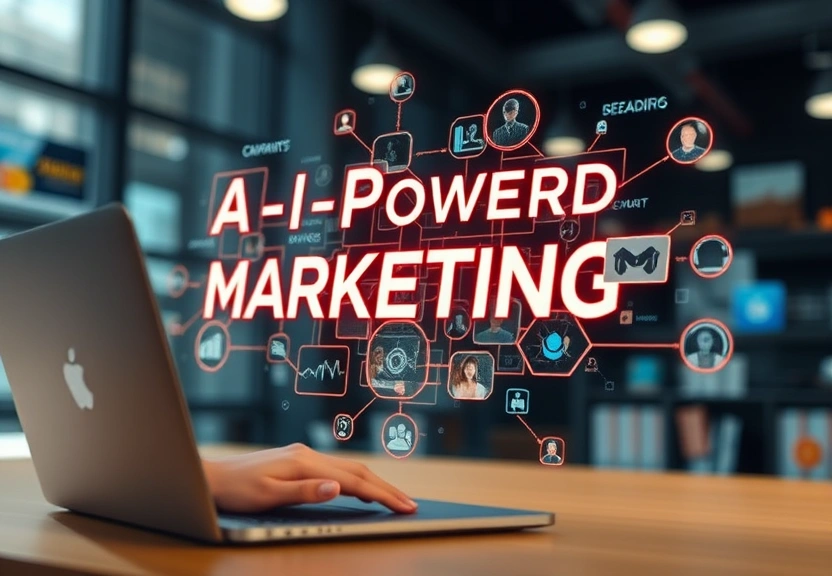The Rise of AI-Powered Marketing Tools: Transforming Strategies in 2025
Introduction
As we approach 2025, the landscape of marketing continues to evolve dramatically, primarily influenced by the rapid advancements in artificial intelligence (AI). The integration of AI-powered marketing tools is not just a trend; it is a fundamental shift that is transforming marketing strategies across industries. This article explores how these innovations are reshaping digital marketing strategies, the role of marketing automation, and the future of marketing technology.

Development Principal
The emergence of AI-driven advertising is redefining how brands interact with their audiences. In 2025, businesses will increasingly rely on AI marketing tools to analyze consumer behavior, predict trends, and create personalized experiences. These tools leverage vast amounts of data to identify patterns and insights that human marketers may overlook, leading to more effective campaigns.
One of the key components of this transformation is the rise of marketing automation trends. Automation tools that utilize AI can streamline processes such as email marketing, social media management, and customer segmentation. By automating repetitive tasks, marketers can focus their efforts on strategic planning and creative development, thus enhancing overall productivity.
Furthermore, AI in marketing allows for real-time data analysis, which helps businesses adjust their strategies on-the-fly. For instance, if an ad campaign is underperforming, AI tools can quickly identify the issue and suggest modifications, ensuring that marketing efforts remain aligned with audience expectations and market demands.
🎥 Related video: The Rise of AI-Powered Marketing Tools: Transforming Strategies in 2025
Analysis and Benefits
The benefits of adopting AI-powered marketing tools are numerous. First and foremost, these tools provide deeper insights into customer preferences and behaviors. By analyzing data from various touchpoints, including social media, website interactions, and customer feedback, AI can help marketers develop a comprehensive understanding of their target audience.
Additionally, artificial intelligence in marketing enables a level of personalization that was previously unattainable. AI algorithms can create tailored content for individual users, enhancing engagement and conversion rates. As consumers increasingly expect personalized experiences, brands that leverage AI will have a significant competitive edge.
Moreover, AI tools help in optimizing marketing budgets. By analyzing the performance of different channels and campaigns, AI can allocate resources more efficiently, ensuring that marketing spend is directed toward the most effective strategies. This not only maximizes ROI but also allows for more agile marketing approaches.
Implementing Practical Strategies
Another crucial aspect is data management. Organizations need to ensure they have access to high-quality data, as the efficacy of AI tools largely depends on the quality of the input data. Implementing robust data collection and management systems will be essential for maximizing the benefits of AI in marketing.
Furthermore, businesses should consider the ethical implications of using AI in marketing. Transparency and consumer trust are paramount. Marketers must be mindful of data privacy regulations and ensure that their use of AI complies with these standards. This will help in building a positive brand image and fostering long-term relationships with customers.

Frequently Asked Questions
What are AI-powered marketing tools?
AI-powered marketing tools are software solutions that use artificial intelligence to automate, analyze, and optimize marketing processes. These tools can help with tasks such as customer segmentation, content personalization, and performance analysis, significantly enhancing marketing efficiency.
How will AI transform marketing strategies by 2025?
By 2025, AI is expected to transform marketing strategies by enabling real-time data analysis, enhancing personalization, automating repetitive tasks, and optimizing marketing budgets. This will lead to more effective campaigns and improved customer engagement.
What are the key trends in marketing automation for 2025?
Key trends in marketing automation for 2025 include increased use of AI for personalization, advanced analytics for data-driven decision-making, integration of multi-channel marketing strategies, and a focus on customer experience to drive engagement and loyalty.
How does AI improve digital marketing strategies?
AI improves digital marketing strategies by providing insights into customer behavior, enabling personalized content delivery, optimizing ad spend, and automating routine tasks. This allows marketers to focus on strategic initiatives and creativity, ultimately leading to more successful campaigns.
What should businesses consider when adopting AI in marketing?
When adopting AI in marketing, businesses should consider data quality, ethical implications, staff training, and alignment with overall business goals. Ensuring transparent data practices and maintaining customer trust is also essential for successful AI integration.
Conclusion
The rise of AI-powered marketing tools is revolutionizing how businesses approach their marketing strategies. As we look towards 2025, it is clear that artificial intelligence in marketing will play a pivotal role in shaping the future of marketing technology. Companies that embrace these changes and adapt their strategies accordingly will find themselves better positioned to meet the evolving needs of consumers, ultimately leading to sustained growth and success in an increasingly competitive landscape.







